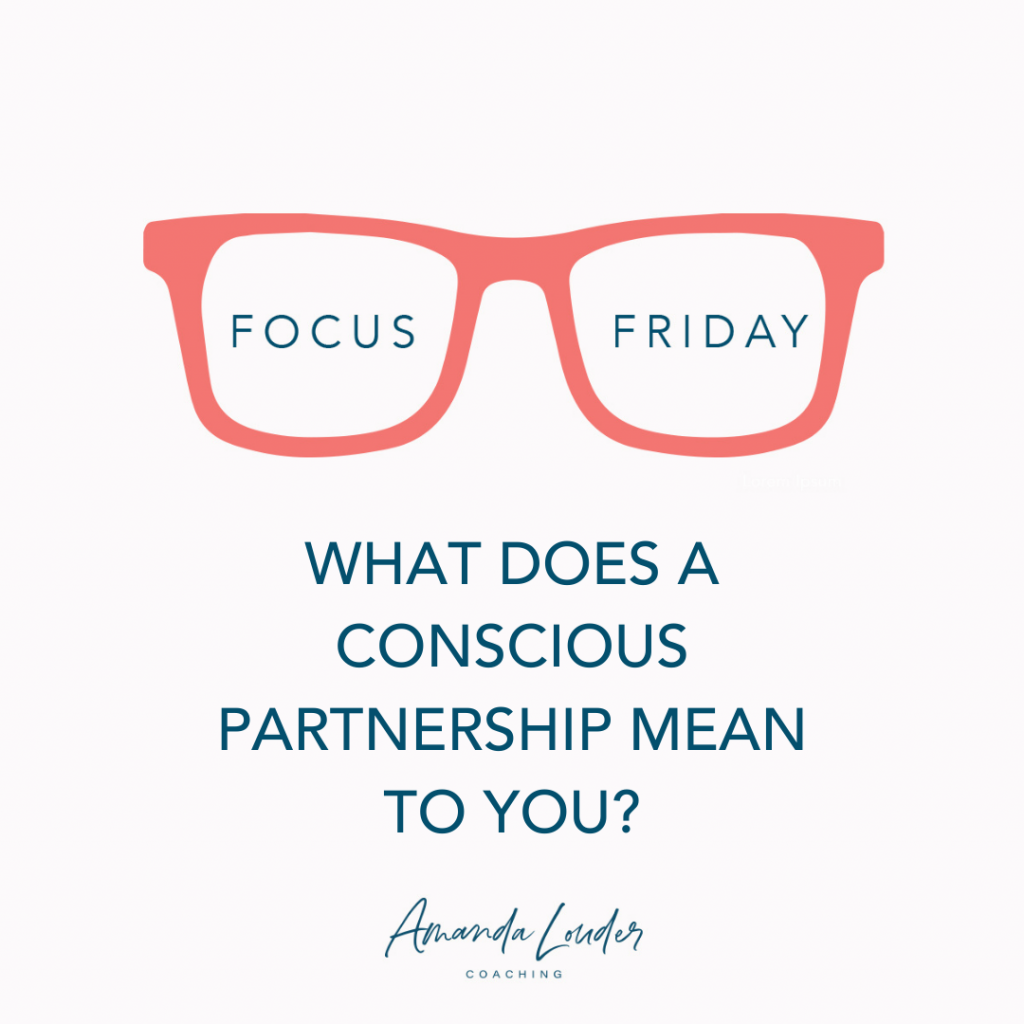
When we get married, we often think that if we married the “right person,” then everything will be easy. This is simply not true. Every relationship takes work. In this episode, we’re talking about conscious partnerships. Let’s go through the 10 attitudes/behaviors that characterize a conscious partnership. Any relationship worth having is worth working for!
Show Notes:
Follow Amanda on Facebook and Instagram.
Join Amanda’s Private Facebook Group.
References for this episode:
Getting the Love You Want by Harville Hendrix, Ph.D and Helen LaKelly Hunt, Ph.D.
Show Summary:
It is my belief that marriage is one of the best ways that individuals are pressured to grow, change, and become the highest versions of themselves. A good marriage is one where each individual is working to become the best version of themselves for not only themselves, but the good of their partner, their children, and others around them.
Dr. Jennifer Finlayson-Fife, in a recent Room For Two podcast episode said, “When you get married you are not committing to another person, you are committing to God about the kind of person you will be. You are committing to be a higher self. To love well. But that is different than “I will be with you no matter what it does to me.”
In order for a marriage to really work, both partners need to be committed to continually working on themselves and make room for both partners to exist. Marriages that really struggle or don’t survive are often because one or both partners stay stagnant in their development. They are looking for their partner to complete them and heal the wounds that they have, rather than working to heal their own wounds. They are looking for validation that they are ok and have expectations about who their partner should be.
In the book Getting the Love You Want by Harville Hendrix, Ph.D and Helen LaKelly Hunt, Ph.D. they talk about a conscious partnership and what that entails.
They said, “a conscious partnership is a relationship that is mutually supportive and fosters the psychological and spiritual growth of both individuals; it’s when both partners focus on the relationship as primary.”
Yes, we want to focus on our individual growth so that we can have the best marriage and partnership that we can.
Hendrix and Hunt give 10 distinct attitudes and behaviors that characterize a conscious partnership.
1 You realize that your love relationship has a hidden purpose – to help you overcome the limitations of your childhood.
This goes back to the premise that all of us have childhood wounds that need to be healed. No matter how wonderful our parents were, we all are looking to heal the wounding we have through our partner. We want to be unconditionally loved. We want our partner to fulfill that need for us.
So, in order to have a more conscious partnership, we need to identify in ourselves what unresolved childhood issues we have that are often masked by our surface needs and desires. If we had a parent abandon us, we may look to our wife to take care of us. If our parents smothered us, we may look to our spouse to give us more autonomy and space. And we equate these behaviors as love. But no wife wants to be her husband’s mother. And I’m sure you can imagine what problems that can cause in the bedroom!
2 You create a more accurate image of your partner.
When we first fall in love, many of our less desirable traits are hidden and masked as we work to put our best feet forward. But once married, we settle in and things come up. Often these negative things about our spouse become the thing we focus on. As you move towards a conscious partnership, you need to see your partner as a whole human. They are neither your adversary nor your savior. They are another human being with both good and bad traits. And just like you, they are often struggling to be happy and stay connected.
3 You learn to ask for what you want, and communicate your needs and desires to your partner.
I don’t know why so many of us believe our partner needs to be a mind reader. “If they loved me, they would just know what I want and need.” Right? Wrong! It’s important to communicate, in a kind and loving way, what we need and desire. Even if our partner is unable to give it to us, we need to be willing to be true to ourselves and be honest about our desires. This one is essential when it comes to sex. Oftentimes we have a partner who is lower desire and so the higher desire partner quits communicating their desires to ease off the pressure. What is a better option is to communicate your desires to your spouse, ask them if they are willing to engage, and learn to self-soothe if they are not. Denying our wants and desires doesn’t help the relationship and usually causes resentment.
4 You move from “reactive living” to “proactive living.”
One of the greatest shifts we can make, and this is something I work on a lot with clients, is go from reacting to responding. From living on auto-pilot to living with purpose and intention. So many couples are living on auto-pilot and are not being intentional about who they want to be, how they want to show up, and what kind of relationship they want to have. To have an extraordinary life and marriage, you can’t live on auto-pilot. You must create the life you want with intention. And this isn’t easy. It really takes understanding what you have been doing for so long, give yourself and your spouse compassion and grace, and work to become better. I love seeing this shift in my clients when everything becomes more purposeful.
5 You learn to value your partner’s needs and wishes as well as your own.
When you are living in an unconscious partnership, you often believe that your partner is there to make you happy and to meet your needs. This never serves you or the relationship because your partner will always fail. Because we are human and we aren’t perfect, they may try sometimes, but they will never be able to make you happy (because it’s not actually possible) and they won’t be able to meet all your needs.
A better approach is to meet your own needs and meet your partner’s when you can. When you can divert more of your energy to working on yourself and working on the good of the marriage, instead of focusing on where your partner isn’t living up to things, it will be so much better.
6 You focus on keeping the relationship safe at all times.
Criticism, blame, shame, stone-walling, contempt, and defensiveness have no place in a marriage. Abuse has no place in a marriage. If these are happening in your marriage, things need to change right now. Marriage should be filled with affirming and positive behaviors so that the marriage can be a safe place where growth and healing can occur. That isn’t to say that negative things won’t happen in your marriage, but those should be approached with kindness and compassion not criticism.
7 You find new ways to satisfy your basic needs and desires.
When things aren’t going well or you aren’t getting what you want in the marriage, what do you tend to do? Pout? Cajole? Shame and blame your partner? Try to coerce them? Distance yourself from them? It’s important to look at your own behaviors and work to establish better patterns. Notice your own wounds coming up and work to heal them.
8 You shift from judgment to curiosity about your partner in order to discover their unique internal world.
When things don’t go how we want them to go, it is often anxiety producing. And often we look to our partners to change in order for us to manage our own anxieties. In an unconscious partnership we often insist our partners be more like us. But in a conscious relationship, you move away from assumptions and judgment and towards curiosity and what to discover who your partner is, accept that they are not you, and revel in the fact that that’s ok. It doesn’t mean you have to be like them either. But making room for two very different people to exist inside the relationship is key.
9 You become more aware of your drive to be loving and united with each other and God.
Can you choose to love your partner unconditionally without expecting something in return? This is truly the pure love of God and Christ as described by charity. As you work to love yourself as God loves you, it makes it easier to love your spouse that way too.
10 You accept the difficulty of creating a lasting love relationship
We often think that if you marry the “right” person then your marriage will be good. In a conscious relationship you realize that you must BE the right partner. A more realistic view is that a good marriage requires commitment, discipline, and the courage to change.
In the same podcast I spoke of early, Dr. Finlayson-Fife also said “It’s so easy for our minds to pull us back to what’s familiar, what’s justified…I mean, if Satan has a playground, it’s there, it’s not sex, it’s self narratives that keep us in our limited positions.”
When we are unconscious, we have a very limited self-narrative, which keeps us stuck and keeps our marriage stuck. But when we can start living consciously, it can really change everything. Living consciously is hard and it’s scary. It requires work. It’s scary to change. It’s uncomfortable to change. But a marriage worth having is a marriage worth working for.
If you would like help becoming more conscious in your marriage, join me in my Embrace You coaching program. This is one of the very first things we start working on…waking up and becoming more conscious and aware of how we are showing up in our marriage and why, and learning how to be more intentional to create the marriage and sexual relationship we actually want.




